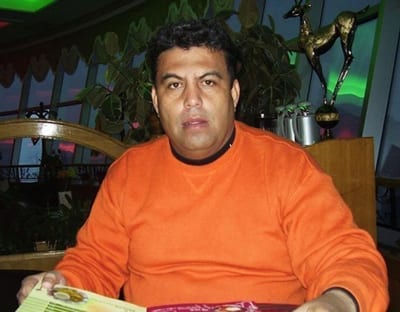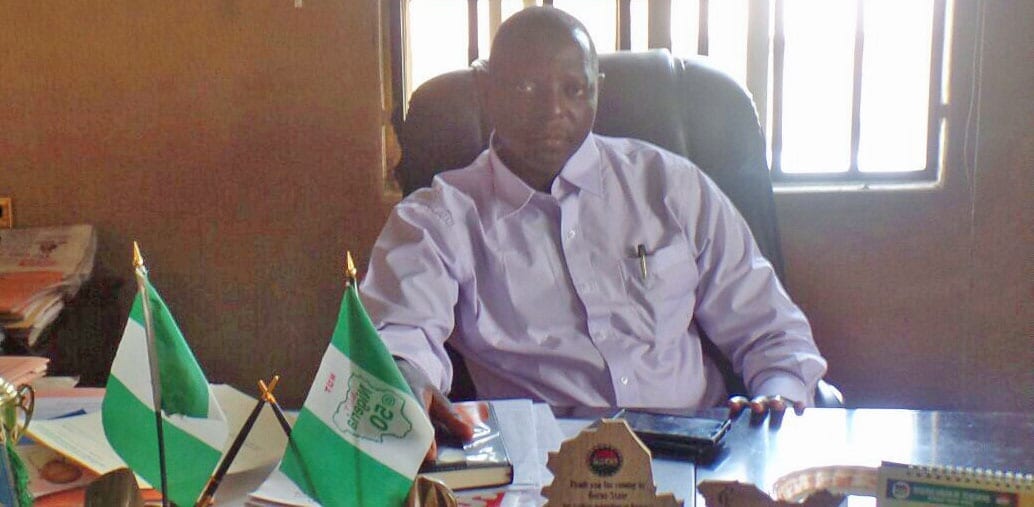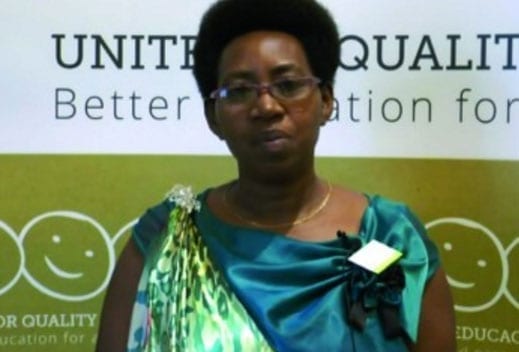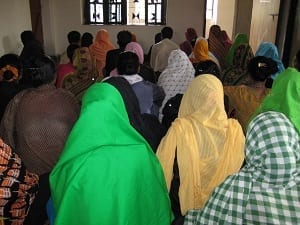
Apr 18, 2016
Since April 2015, at least 14 Honduran union leaders and members have suffered threats or violence, including one who was disappeared and another one who was murdered, part of a campaign of intimidation against worker rights documented in a new report by the Union Network against Anti-Union Violence in Honduras.
Days after the report’s release, Nelson Geovanni Núñez Chávez eceived renewed death threats for helping banana workers form unions, according to the Honduras-based nonprofit ACI-Participa. Last November, Núñez Chávez was forced to leave his home with his family after repeatedly being followed and harassed.
Nuñez Chavez is an organizer for the Honduran agricultural workers’ union, Sindicato de Trabajadores de la Agroindustria y Similares (STAS), and host of the radio program, “Unionist on the Air.”
Four of the 14 union members and leaders who were victims of violence were active in the Network against Anti-Union Violence—a trend Honduran human rights activists say is a troubling development that may indicate those who actively seek justice for perpetrators of violence are targeted for attack.
Héctor Martínez Motiño, president of a local sectional union of Workers of the National Autonomous University of Honduras (SITRAUNAH), was murdered in June despite protection from the Inter-American Commission on Human Rights (IACHR). Environmental activist Berta Cáceres Flores, who was murdered last month in Honduras, also had IACHR protection. Observers say there was no police presence around either Martínez Motiño or Cáceres when they were killed. ACI-Participa has documented the assassination of 13 recipients of precautionary measures.
Two union leaders also faced death threats as they defended worker rights at agro-industrial plantations cited in a 2012 complaint filed by the AFL-CIO and 26 Honduran unions and civil society organizations over the Central American Free Trade Agreement (CAFTA). The complaint alleges the Honduran government failed to enforce labor rights under its labor laws.
A report released yesterday by an international fact-finding commission, “Justice for Berta Cáceres Flores,” cited the “ineffectiveness of the Honduran state’s human rights protection system, as well as a prevailing institutional practice that ignores the rights of the victims of human rights violations as active rights holders.”
Honduras passed a law six months ago that protects human rights defenders, but has not issued a regulation on its implementation or enforcement.
The Network against Anti-Union Violence in Honduras, a Solidarity Center ally, was created in 2014 to document violence against union members and push for an end to impunity for those who commit such crimes. No formal statistics on violence against trade unionists existed before the network formed.

Feb 18, 2016
In northeastern Nigeria, where violence has terrorized communities over the past several years, the Nigerian Union of Teachers is going beyond the difficult task of ensuring students continue to receive an education and teachers get the support they need. Union leaders and members have taken on the enormous job of providing housing, food and medical assistance to some of the thousands of teachers and their families displaced by the upheaval.
In Borno state, where the teachers’ union includes members from 2,000 schools, the union converted nearly all of its conference space into housing for those displaced by the violence. The union has provided food, clothing and shelter to some 200 union members and their families in the past year. It also has created a database of Borno-based union members killed in the insurgency. The union has tallied 388 teachers killed in Borno as of January, the majority of the more than 600 Nigerian teachers killed by suspected Boko Haram in the northeast.
“Teachers are traumatized and hence hold lessons in fear,” says Bulama Abiso, chairman of the Borno state branch of the Nigerian Union of Teachers and a former teacher and principal. “They fear suicide bombers’ infiltration of the school.” Over the past six years, Boko Haram has targeted public and private schools in northeast Nigeria, dousing the facilities with gasoline at night and setting them ablaze. Militants have also hurl homemade bombs at the concrete classrooms.
Across the country, some 19,000 teachers have been displaced, Michael Alogba-Olukoya, told the International Business Times. Alogba-Olukoya is president of the Nigeria Union of Teachers, a Solidarity Center ally.
Despite the incredible personal risk, teachers continue to their jobs in the classroom. To encourage students to return to school, Suleiman Maina, the state representative of the National Union of Teachers in Borno state, says the union is partnering with the government and other stakeholders to keep as many schools as possible open in and around the state capital.
“Our state governor has formed a high-powered committee” which includes representatives of the Nigeria Union of Teachers, principals and other stakeholders,” he says. “Out of about 1,000 primary schools, now 400 in Maiduguri and outskirts are running. It is so encouraging because now in schools, teachers are performing their jobs,” he says.
Adamu Wakawa, principal of Government Girls College in Maiduguri, the Borno state capital, leads a school that also serves as a camp for internally-displaced people. “Managing students and displaced persons is the greatest challenge that we are now facing,” he told the Nigeria Union of Teachers. “As far as I’m concerned, together with the government, effort is being made to see that students do not lose.”
In addition to raising awareness about political violence as a workplace health and safety issue for front-line workers, Abiso, who also serves as vice chairman of the Nigeria Labor Congress for Borno State Council, says the union has opened a door to conversations linking civil society with government, and is a member of key committees considering policy on resettlement of those displaced. Union leaders also are planning for opportunities for youth when the conflict ends.

Dec 18, 2015
Hundreds of union leaders and members, including at least 250 teachers, have fled Burundi while dozens more have been jailed, as the east African country roils in widespread violence. In October, a journalist and his family were shot dead at their home by security forces, according to the International Federation of Journalists. Broadcast media workers also were attacked with heavy weapons in May.
“I was part of a teacher’s union and because I was helping teachers fight for their rights, I was seen as an opponent,” according to one teacher, now in internal exile in the country’s Makamba Province. “A friend in the police told me that I was on the ‘list’ to be arrested so I had to flee.”
The refugee’s story is among those collected in a Refugee International report which found that Burundians were threatened by police due to their membership in civil society organizations perceived not to be supportive of the government, such as human rights organizations and unions.
Unions and their members also are being targeted in other ways. For instance, the Syndicat des Travailleurs de l’Enseignement du Burundi (STEB), which represents teachers, reports that its bank account was ordered closed last week.
Over the weekend, 87 people were killed. Since April, some 220,000 people have fled Burundi and 15,000 people have been displaced within the country. The violence stems from protests that began after President Pierre Nkurunziza decided to run for a third term.
The United Nations Human Rights Council approved a resolution yesterday calling for the quick deployment of experts to Burundi to look into abuses amid the growing violence. The UN high commissioner for human rights has called on Burundi’s leaders to disarm pro-government militias, halt torture and resume political dialogue, saying that sanctions, asset freezes and travel bans should be imposed on those responsible for abuses.

Nov 17, 2015
Honduran union leader Nelson Geovanni Nuñez Chavez was forced to leave his home with his family last week after repeatedly being followed and harassed, according to the Honduras-based nonprofit ACI-Participa. Nuñez Chavez is technical adviser to the Honduran agricultural workers’ union, Sindicato de Trabajadores de la Agroindustria y Similares (STAS), and host of the radio program, “The Unionist, Live.”
In late October and early November, strangers in a black pickup truck with tinted windows repeatedly parked outside Nuñez Chavez’s home in El Progreso and took photos of the house from different angles, according to ACI-Participa. Nuñez Chavez says he when he attempted to file a report with the police officials, they would not accept it because they said no harm had occurred.
Nuñez Chavez’s radio host predecessor, José María Martínez, a STAS ally, was forced to leave the country in July 2014 following repeated death threats against him and his family. At least nine union leaders have been attacked or killed in Honduras this year, and others have been threatened with violence. (ACI-Participa recently released a report, in Spanish, documenting violence against union leaders.)
El Progreso, in northern Honduras, is surrounded by plantations producing palm oil, bananas and vegetables. Nelson Nuñez is among union leaders helping agricultural workers who are contracted or employed in the sector to form a union.
In September, STAS President Tomás Membreño Pérez received death threats by phone and on Facebook and was followed as he traveled to the Santa Rita banana plantation where he was helping workers get a voice on the job. Like several union leaders threatened, attacked or murdered, Pérez is a member of the Network of Unionists against Antiunion Violence. The network, which includes ACI-Participa and the Solidarity Center, was launched late last year to combat government corruption and stand up to increasing violence and threats against worker rights activists.
Violence against union leaders in Honduras nearly always goes unpunished, even though Honduras is under scrutiny for failure to enforce its labor laws. The United States is waiting for the Honduran government to present a corrective plan of action to address labor rights violations, a move required after the U.S. Department of Labor’s Office of Trade and Labor Affairs last year accepted a complaint under the labor chapter of the Central American Free Trade Agreement (CAFTA).
The AFL-CIO and 26 Honduran unions and civil society organizations filed the complaint in March 2012. In a February 2015 report, the U.S. Trade and Labor Affairs office said Honduras has made virtually no progress since then.
The network issued a public appeal to the national police, national commissioner for Human Rights, the Human Rights Department and other state institutions “to take the necessary measures to safeguard” Nelson Nuñez’s life.

Sep 9, 2014
A garment union leader and her husband were brutally attacked in late August, marking the latest incident of apparent factory-sponsored violence against workers attempting to exercise their right to freedom of association and to just, safe jobs in Bangladesh’s garment factories.
In August 26 as Mira, acting union president at Global Trousers Ltd. in Chittagong, and her husband waited for the bus to take them home after work, several men—armed with iron rods, their faces hidden by handkerchiefs—violently attacked her. She was knocked unconscious following a blow to the head, and her husband, who rushed to help her, also suffered a beating. After the attack, Mira was rushed to a local hospital in critical condition.
The couple report that a low-level manager pointed Mira out to their attackers, and that the men shouted throughout the assault that they would kill the pair unless they resigned from the trade union and left the factory. Days earlier, workers said a group of men with knives were waiting for Mira outside the factory gates, though a change in her routine kept them from carrying out their plan.
In 2011, a new wave of organizing spread across Bangladesh after a long drought when no new independent unions were able to organize. At that time, workers at Global Trousers were among the first to try and organize a trade union—encountering intense resistance from their employer. Although the union met the legal requirements to be registered officially as a trade union, factory management contested its registration, which has since been working its way through the courts. The High Court ruled earlier this year that the case should be transferred to the country’s labor courts but that the union could now legally operate as a trade union inside the factory.
While only three of the original union leaders are left in the factory, union members have continued to persevere under the guidance and leadership of their trade union federation, Bangladesh Independent Garment Workers Union Federation (BIGUF). In the last several months, workers have recruited new members and established a union dues structure through which they are regularly collecting dues from members to continue to build a strong, sustainable organization.
However, management has strengthened its campaign against the union as well. In August, union leaders reported that managers at various levels within the factory told them they would face severe consequences for their activism. On August 22, another union leader reported that men, their faces disguised, dragged her and her husband from their home to attack them but were driven off by people in the community.
The union, with assistance from BIGUF, has filed police reports and sent letters to relevant government officials, the Bangladesh Garment Manufacturers and Exporters Association and other local stakeholders to demand justice for the anti-union acts and for management to respect the union’s legal right to exist. And on September 3, union leaders joined with other BIGUF union members and other labor allies to draw attention to the issue in front of the National Press Club in Dhaka. To date, the perpetrators of the assaults remain at large.





